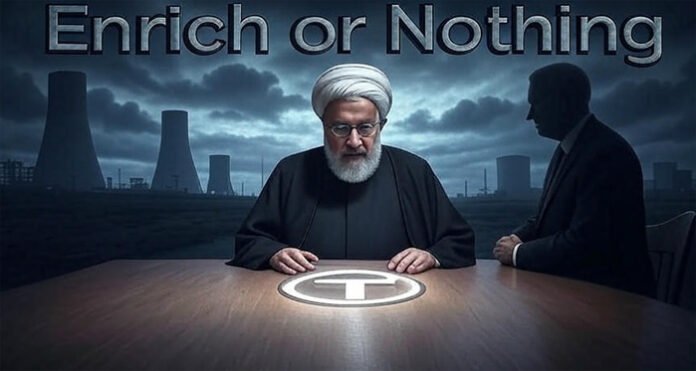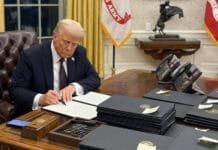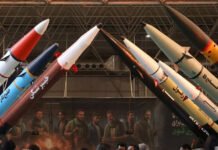
INVC NEWS
Tehran – : Iran’s Supreme Leader Ayatollah Ali Khamenei has issued a strong rebuke of a recent US proposal presented during indirect talks over Tehran’s rapidly advancing nuclear program. While Khamenei did not entirely dismiss the idea of a future diplomatic agreement, he labeled Washington’s offer as fundamentally flawed and contrary to Iran’s self-reliant strategic doctrine. The Supreme Leader’s remarks come at a critical juncture when the international community closely watches Tehran’s nuclear ambitions and the geopolitical balance in West Asia.
Khamenei’s Position: A Clear Rejection of Dependency
Ayatollah Khamenei’s speech delivered before a gathering of senior officials laid bare Iran’s unflinching stance on maintaining full autonomy over nuclear enrichment. He declared the US proposal to be “completely against the concept of ‘we can do it’,” a phrase symbolic of Iran’s long-standing policy of resistance and self-sufficiency.
Referring specifically to uranium enrichment, Khamenei emphasized the essential nature of this capability. “If we have 100 nuclear power plants and they have not been enriched, then they are not usable for us,” he stated. “If we cannot do enrichment, then we should extend our hands to America.” This remark underlined the strategic priority Tehran places on retaining the technological and industrial capacity to enrich uranium within its own borders.
The Strategic Significance of Uranium Enrichment
Iran’s insistence on maintaining its uranium enrichment capacity is more than a national pride issue—it’s deeply embedded in Tehran’s energy independence strategy and defense posture. Enriched uranium serves both civilian and military functions. By controlling the process internally, Iran not only boosts its energy sovereignty but also retains leverage in any future geopolitical negotiations.
The US proposal reportedly offers Iran access to nuclear fuel via an international consortium. However, this approach would sideline Iran’s enrichment infrastructure, leaving Tehran dependent on foreign enrichment services. For Iran, this is not just unacceptable; it’s strategically dangerous. Khamenei’s remarks signal that any agreement requiring Tehran to dismantle or pause its uranium enrichment process would be a non-starter.
The US Proposal: A Lack of Clarity and Transparency
Despite five rounds of back-channel negotiations, the details of the US proposal remain vague. A recent investigative report confirmed by a senior American official indicates that Washington may be willing to allow Iran to enrich uranium to a limited degree—reportedly up to three percent purity—for a restricted time period. This would be far below weapons-grade levels but may not satisfy Iran’s long-term strategic goals.
The proposal also includes forming a nuclear alliance in the region to enrich uranium on behalf of Iran and neighboring countries. Such a framework would remove Iran from direct enrichment control, thereby neutralizing a key element of its nuclear doctrine. The ambiguity surrounding whether Iran would be compelled to completely abandon enrichment continues to fuel mistrust between Tehran and Washington.
Washington’s Diplomatic Gamble and Regional Fallout
The attempt to forge a new agreement with Iran has emerged as a priority for President Donald Trump’s administration, particularly for Steve Witkoff, the US Special Envoy for West Asia Affairs. Their goal: to ease regional tensions, particularly in the aftermath of escalating violence in Gaza and strained relations with Hezbollah and the Houthis.
Should Iran accept the deal, the US could ease harsh economic sanctions, including those targeting oil exports, banking systems, and advanced technologies. In exchange, Iran would be expected to either limit or suspend its uranium enrichment program. However, any agreement that appears to undermine Iranian sovereignty is bound to meet strong resistance—not only from Iran’s political leadership but also from hardline factions within the country.
Failure to reach a consensus could further inflame already tense conditions in West Asia, particularly amid ongoing conflicts involving Israel, Hamas, and other regional actors. Tehran’s adversaries are also watching closely, especially Israel, which sees Iran’s nuclear potential as an existential threat.
Khamenei’s Calculated Messaging to the West and Region
Ayatollah Khamenei’s latest comments serve several purposes. Domestically, they reassure Iranian citizens and power centers that Iran will not bow to foreign pressure. Internationally, the remarks serve as a warning: Iran is open to diplomacy but only on its terms.
By reaffirming the importance of domestic enrichment capacity, Khamenei sends a clear signal that Iran will not accept a deal that relegates it to a dependent state in the global nuclear order. His messaging also consolidates Iran’s strategic alignment with countries like Russia and China, which have historically supported Tehran’s right to peaceful nuclear energy under the Nuclear Non-Proliferation Treaty (NPT).
Implications for Global and Regional Stability
If negotiations stall, escalation is likely. The nuclear impasse could push Iran to expand its uranium enrichment beyond the three percent threshold, edging closer to the levels required for weaponization. This would likely provoke military responses or additional sanctions from the US and its allies, exacerbating instability in the Persian Gulf and beyond.
Conversely, a compromise deal would need to satisfy both Washington’s non-proliferation goals and Tehran’s sovereignty concerns. This is a narrow path to navigate, and current diplomatic messaging suggests neither side is ready to concede ground.
A Fork in the Road: Deal or Deterrence
The current diplomatic situation places Iran and the US at a strategic crossroads. One road leads to a mutually acceptable deal that could reduce tensions and potentially restore some economic normalcy for Iran. The other path points toward deepening hostilities, marked by economic warfare, cyberattacks, and potential military clashes in key areas like the Strait of Hormuz.
Ayatollah Khamenei’s unwavering stance on uranium enrichment reflects more than national pride—it is a declaration of strategic intent. Until the US proposal respects Iran’s core interests, including its right to enrich uranium domestically, progress toward a sustainable agreement is unlikely.















